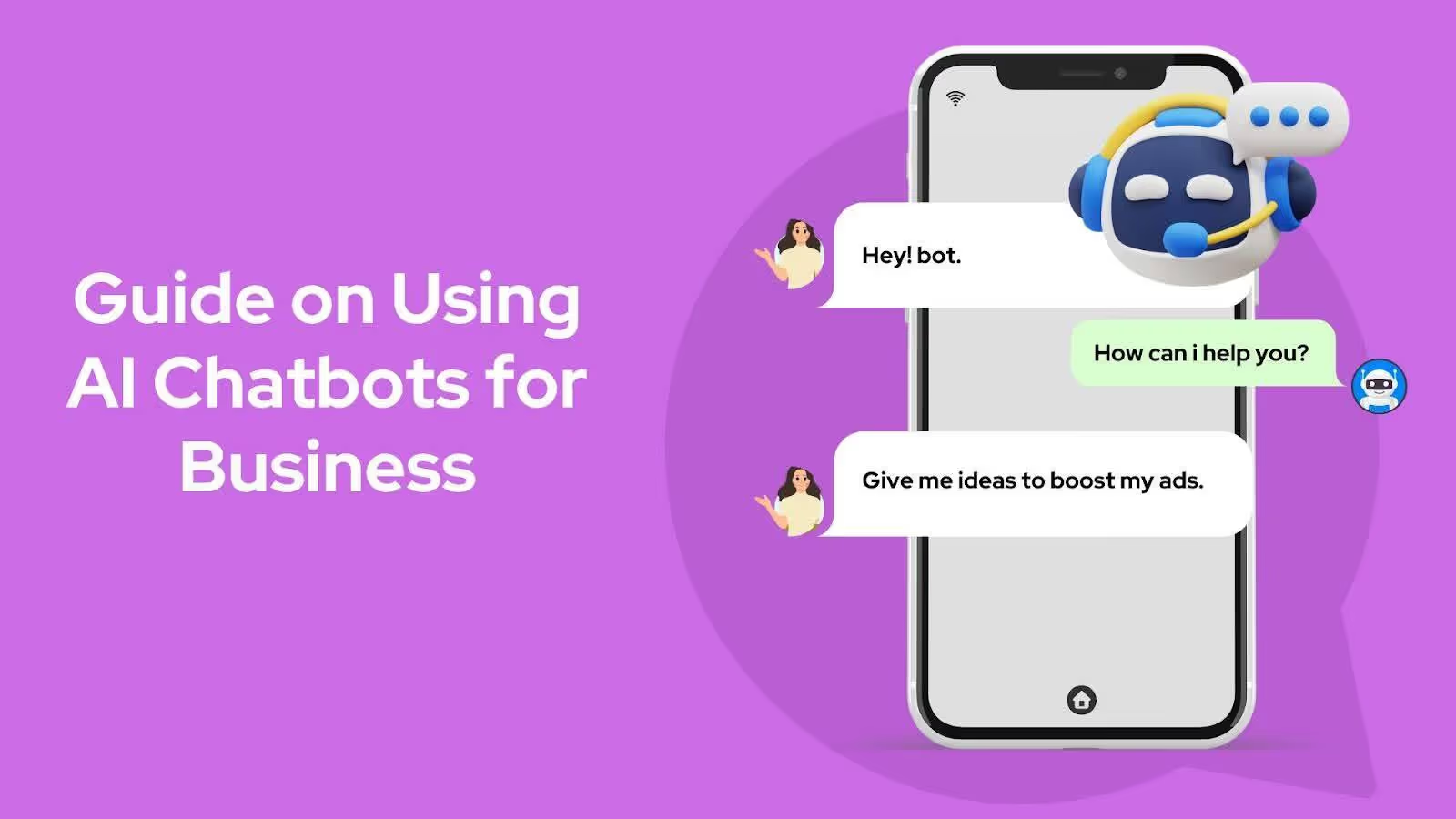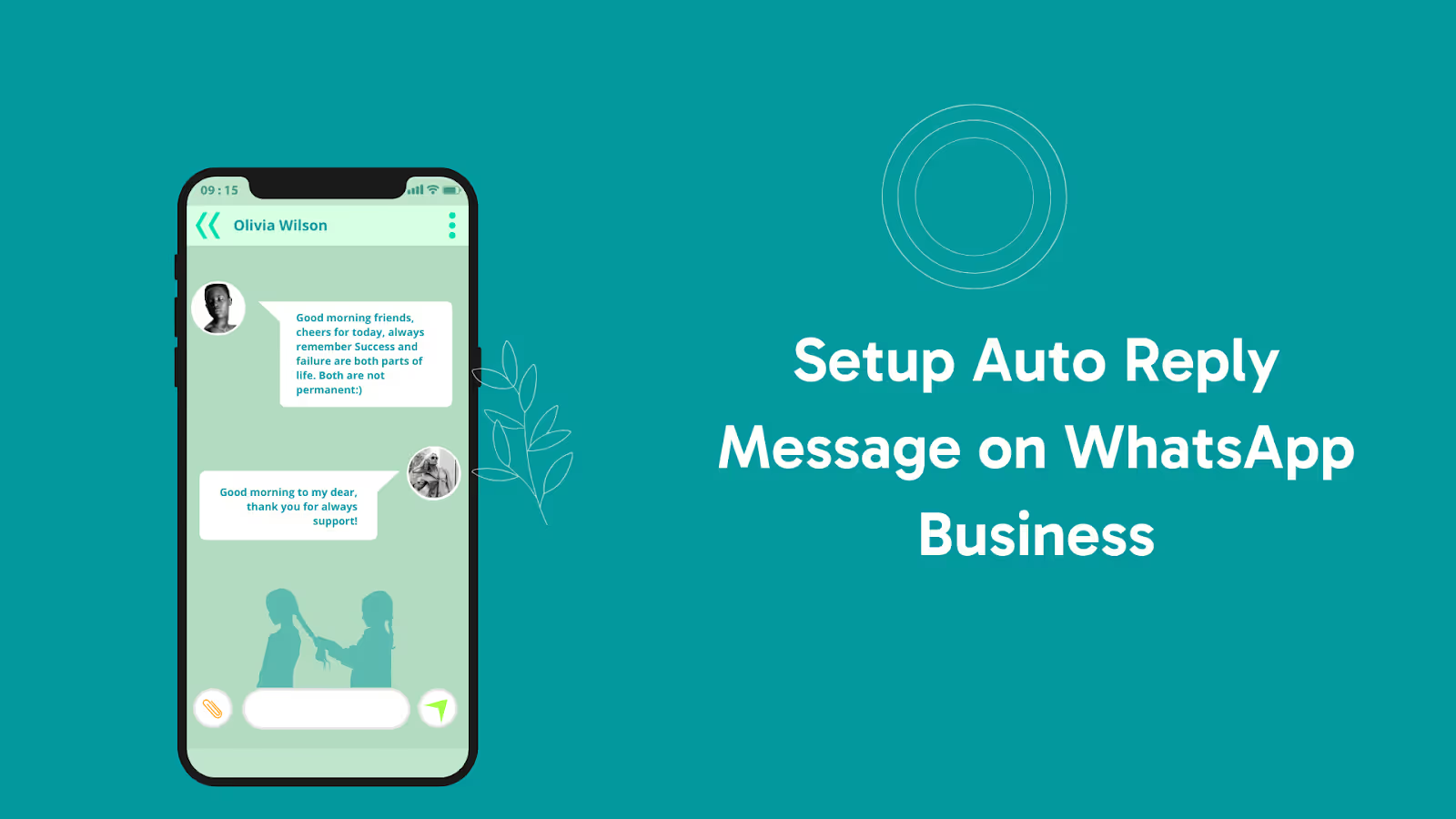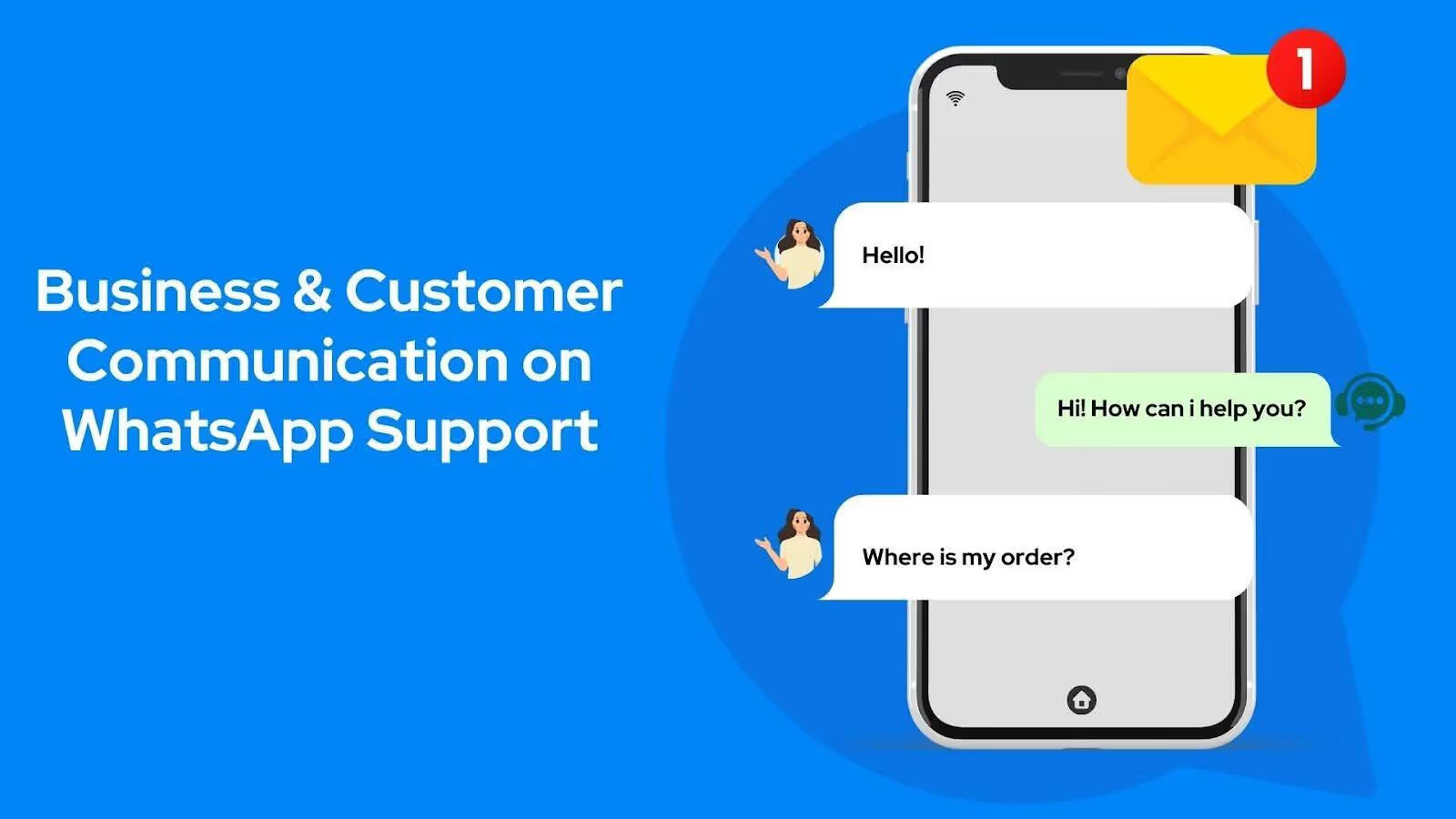Guide on Using AI Chatbots for Business

Artificial Intelligence (AI) may sound futuristic, but it’s already reshaping how businesses interact with customers. AI chatbots are at the heart of this transformation. Consider them your company’s round-the-clock virtual agents, answering questions, resolving issues, and boosting revenue.
Let’s face it, though: AI chatbots are the subject of much buzz. While some think they’re miraculous, others worry they’ll steal jobs or frustrate customers. The reality? AI chatbots are not magical or dangerous. They are intelligent tools that can offer your company a competitive advantage if used properly.
Imagine this: A customer pings your company at midnight with a missed delivery. They are promptly helped with a chatbot that tracks their order and provides a discount for the inconvenience, saving them from waiting hours for a response. Not only is that excellent customer service, but it also revolutionizes customer retention.
This guide will explain everything you need to know, regardless of whether you are just starting with AI or want to improve your chatbot strategy. We can help you with everything from defining AI chatbots to investigating how companies like yours utilize them.
Understanding AI Chatbots

AI chatbot is a software that uses artificial intelligence to simulate human-like conversations. AI chatbots may understand user intent, learn from interactions, and provide more relevant, natural responses than traditional rule-based bots that respond to pre-written responses.
Let's examine what makes AI chatbots so effective at changing business-to-customer interactions now that you know what they are.
Core Capabilities of AI Chatbots
AI chatbots are not merely virtual assistants but to improve customer experiences and streamline company procedures.
- Conversational AI: Like people, they can converse, comprehend context, and even engage in small talk.
- Personalization: They can customize responses by utilizing consumer data, which gives encounters a distinctive feel.
- Learning on the Job: Advanced AI bots use machine learning to enhance their responses.
AI chatbots are proactive rather than merely reactive. Based on previous behavior, they can cross-sell, remind clients about cart abandonment, and make product recommendations.
Businesses from various industries use AI chatbots, which is unsurprising given their wide range of capabilities. Now, let's explore the advantages they offer.
Benefits of AI Chatbots for Business

AI chatbots are game-changers for businesses looking to keep their operational costs in check and also want to enhance their customer experience.
- Enhanced Customer Service
Your clients want prompt, precise responses. That's what AI chatbots do. They allow human agents to work on more complicated problems by managing standard inquiries like order tracking or frequently asked questions.
For Example: During holiday sales, a retail store may receive thousands of "Where’s my order?" questions. An AI chatbot can instantly check order statuses and share customer updates, leaving human agents to manage escalations or personalized issues.
Stat Alert: A report from Salesforce found that 64% of consumers expect real-time responses from businesses.
- Cost Savings Through Automation
It costs money and takes time to hire, train, and oversee an extensive customer service crew. AI chatbots can manage thousands of requests simultaneously, lessening the strain on human agents and lowering operating expenses without sacrificing service quality.
For Example, An e-commerce company can use an AI chatbot to automate routine processes like refunds, cancellations, or payment inquiries. This frees up resources to invest in strategic areas like product development or marketing.
- 24/7 Availability
Customers don’t stick to 9-to-5 schedules. With an AI chatbot, your business is “always on,” providing instant support anytime.
For Example, A travel agency can use an AI chatbot to answer late-night questions, assist prospective clients with booking flights, secure accommodations, or explain visa procedures, even when human staff is unavailable.
- Data Insights and Analytics
Each conversation with an AI chatbot produces valuable information. These insights enable companies to make well-informed decisions and enhance their strategies, from detecting client pain spots to forecasting future trends.
For Example, A fashion retailer uses AI chatbot data to identify common inquiries concerning environmentally friendly products. Based on this information, they might introduce a new sustainable line, increasing sales and brand loyalty.
With these clear benefits, AI chatbots are rapidly becoming indispensable. However, what kinds of chatbots are out there, and which one is best for your company? Let's investigate that.
Types of AI Chatbots

AI chatbots are not all made equal. They can be divided into four primary categories based on their function, each of which is suited to particular business requirements:
- Transactional Chatbots
These chatbots are experts in carrying out particular duties like scheduling appointments, processing orders, and managing transactions. They are made to lead people through simple procedures effectively.
For Example, A salon uses a chatbot to schedule appointments, allowing consumers to choose a service, select a time and date, and receive confirmation without human assistance.
Where it is Used: E-commerce, hospitality, healthcare scheduling, and food delivery services.
- Informational Chatbots
These bots are mainly used for information sharing, addressing commonly asked questions, and assisting users with policies and procedures. They offer rapid and straightforward information access without the need for human support.
For Example, A chatbot at a university can quickly provide students with information about course schedules, admission requirements, and campus amenities.
Where it is Used: Educational institutions, government portals, and company help centers.
- Problem-Solving Chatbots
These bots have advanced AI skills, designed to solve complicated problems like account recovery and technical help. They examine user input, pinpoint the issue, and offer detailed fixes.
For Example, A telecom provider uses a chatbot to assist consumers with billing issues or Wi-Fi router resets.
Where it is Used: Tech support, banking, and IT service management.
- Hybrid Chatbots
These chatbots integrate features, manage transactional duties, respond to informational inquiries, and resolve issues in a cohesive system. They are adaptable and capable of handling a variety of client encounters.
For Example, A retail company uses a hybrid chatbot with a single chat interface to track orders, make product recommendations, and handle return requests.
Where it is Used: Retail, travel, and businesses requiring multi-purpose chatbots.
After learning about the various kinds, you may be curious about how these bots function in practice. Let's break down the technology underneath them.
Getting Started with AI Chatbots

Although putting AI chatbots into practice may seem like a difficult undertaking, it can be completed smoothly with the correct strategy and resources. Understanding your company's requirements, choosing the best chatbot, and ensuring it integrates seamlessly with your current systems are crucial.
- Assess your Business Needs
Determining what you want the chatbot to do is the first step. Are you trying to increase revenue, improve client interaction, or automate repetitive queries? Defining your goals will help you choose the right type of chatbot, whether transactional, informational, or hybrid.
Pro Tip: An informational or transactional chatbot can be your best option if your main objective is to track orders and provide prompt answers to frequently asked questions.
- Choose the Right Platform
Choosing a trustworthy platform is essential to your chatbot's successful implementation. This is where solutions like LimeChat come in.
LimeChat's advanced Support Suite includes technologies like intelligent CSAT, Level-3 AI, and omnichannel CRM to make customer interactions more efficient.
This device assists companies of all sizes in improving their services, whether providing essential assistance or analytics.
Why LimeChat? It’s tailored for businesses that want an intuitive, powerful, and scalable chatbot solution—without the steep learning curve.
- Integration is Key
Ensure your chatbot works in sync with your website, social media accounts, and other customer support platforms for optimal effectiveness. Your users can have a consistent experience with a chatbot that operates on several platforms.
LimeChat’s omnichannel support ensures you can engage with customers whether they’re on Instagram, WhatsApp, or your website.
- Start Small and Scale
Automating everything at a time is optional. Start by focusing on one or two important areas, like order tracking or frequently asked questions, and then, as you get more insight into your clients' demands, you may add more features to your chatbot.
Pro Tip: A small retail business can start with a FAQ bot and then progress to a hybrid chatbot that manages returns, product recommendations, and order tracking.
With a clear strategy and the right tools, you’re set up for success. Now, let’s explore the essential features that make an AI chatbot effective.
Key Features for Effective AI Chatbot Implementation

An AI chatbot needs certain capabilities to support your objectives to improve customer satisfaction and business operations. Here are the essential features:
- Integration Capabilities
A chatbot is only as good as its ability to work seamlessly with your existing tools and platforms. Integration features are essential, whether you're using them to sync with social media for inquiries, integrate with e-commerce platforms for order monitoring, or connect with your CRM to get customer data.
Why It Matters: Lack of integration can lead to disconnected customer experiences, missed opportunities, and inefficiencies in workflow.
- Omnichannel Support
Consumers today interact with companies on various channels, including websites, messaging apps, social media, and email. A chatbot offering a unified experience across all platforms guarantees smooth client communications and fosters confidence.
Why It Matters: Customers don’t want to repeat themselves when switching platforms. Omnichannel support ensures conversations pick up where they left off, improving satisfaction and loyalty.
- Personalization
Customers expect chatbots to understand their preferences, interactions, and purchasing history. Customization turns a generic bot into a useful helper.
Why It Matters: Personalized interactions boost engagement and drive sales and repeat business.
- Security and Compliance
The chatbot must handle consumer data safely and responsibly, in compliance with industry standards such as the CCPA or GDPR. Essential features include role-based access, encrypted chats, and compliance audits.
Why It Matters: With robust security measures, customer trust can stay high, and businesses can avoid legal penalties.
Even though these characteristics are essential for success, clarifying some widespread myths and misunderstandings regarding AI chatbots is critical. In the next section, let's correct the record.
Myths About AI Chatbots

Even if AI chatbots are becoming more and more popular, they are frequently misinterpreted. By defining what is fact and what is fiction, let's debunk some of these myths:

To see their true value in action, let's examine a practical example of how companies are effectively utilizing AI chatbots to revolutionize client relationships.
Real-World Success: How LimeChat’s AI Chatbots Helped Brands
LimeChat's AI-powered chatbots have demonstrated their capacity to revolutionize consumer relationships. LimeChat's products have helped several brands increase efficiency, automate inquiries, and improve customer happiness. Here are two inspiring examples:
Kapiva
Kapiva, a health and wellness brand, elevated its customer support experience using LimeChat’s E-commerce GPT Bot on WhatsApp.
Results Achieved:
- Bot CSAT: 4+ rating, showcasing exceptional customer satisfaction.
- Queries Automated: 86%, freeing up human agents for complex issues.
- Efficiency Boost: 10% improvement in operational processes.

Source: Kapiva.com
Wow Skin Science
Wow Skin Science utilized LimeChat's GPT-Powered AI Bot to deliver a seamless shopping experience and boost conversions.
Results Achieved:
- Automation Increase: 9.8% overall improvement in query handling.
- Better Conversion: 23% increase, directly driving revenue.
- Lower Confusion: 8x reduction in customer misunderstandings, enhancing the shopping journey.

Source: buywow.in
Are you interested in reading more client success stories? View LimeChat's case studies to learn how companies use AI chatbots to redefine customer relationships.
Conclusion
AI chatbots, which provide features like improved customer service, cost reductions, 24/7 availability, and insightful data, are revolutionizing how companies engage with customers. The endless possibilities range from answering common questions to providing individualized experiences.
With its advanced Support Suite and E-commerce GPT Bot, LimeChat stands out in this rapidly changing market. LimeChat demonstrates its worth as a reliable partner in AI chatbot solutions by helping companies like Kapiva and Wow Skin Science achieve higher automation rates, better conversions, and increased productivity.
Ready to transform your customer interactions? Contact LimeChat today and discover how AI chatbots can elevate your business.
Transform your marketing and support today





.avif)
